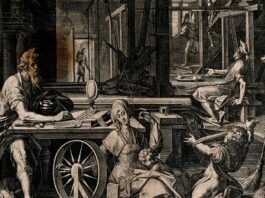
Paul arrived in Corinth around the year 50, where he encountered Priscilla (or Prisca) and her husband Aquila. Like Paul, they were tentmakers and Jewish, newly arrived from Rome after Emperor Claudius expelled the Jewish community from the city. Roman historian Suetonius attributes this expulsion to the disturbances caused by someone named “Chrestus,” likely a reference to conflicts between Christian and non-Christian Jews.
The religious beliefs of Priscilla and Aquila before meeting Paul remain uncertain. We don’t know whether they were already Christians or if they converted to Christianity after hearing Paul’s preaching. Regardless, they accompanied Paul to Ephesus after 18 months in Corinth. Priscilla and Aquila stayed in Ephesus while Paul journeyed on to Antioch.
During their time in Ephesus, Priscilla and Aquila befriended a man named Apollos, an eloquent preacher who had accepted some aspects of the Christian message. Apollos was a knowledgeable interpreter of the Hebrew Scriptures. Priscilla and Aquila expanded his understanding of the Gospel, enhancing his preaching capabilities.
There is evidence to suggest that Priscilla and Aquila were in Rome when Paul wrote to the congregation there, and later they were in Ephesus with Timothy when Paul wrote his final letter to him. In fact, Paul often included their greetings in his letters from Ephesus to the Corinthians, demonstrating their close relationship and shared commitment to spreading the Christian faith.
Priscilla and Aquila are mentioned six times in the New Testament (Acts 18:2,18,26; Romans 16:3; 1 Corinthians 16:19; 2 Timothy 4:19). Interestingly, the order of their names alternates in these mentions – Aquila comes first in odd-numbered references, and Priscilla in even-numbered ones. This could underscore that they are equal partners in their religious endeavors.
Photo credit: Fæ via Wikimedia Commons
The post Saints Aquila and Priscilla appeared first on uCatholic.
Daily Reading
Tuesday of the Thirty-fourth Week in Ordinary Time
Reading 1 RV 14:14-19 I, John, looked and there was a white cloud, and sitting on the cloud one who looked like a son of man, with a gold crown…
Daily Meditation
Do Not Be Led Astray, Do Not Fear
Click here for daily readings In this somewhat confusing Gospel passage Jesus says two things in particular that stand out to me. “Take heed that you are not led astray”…




